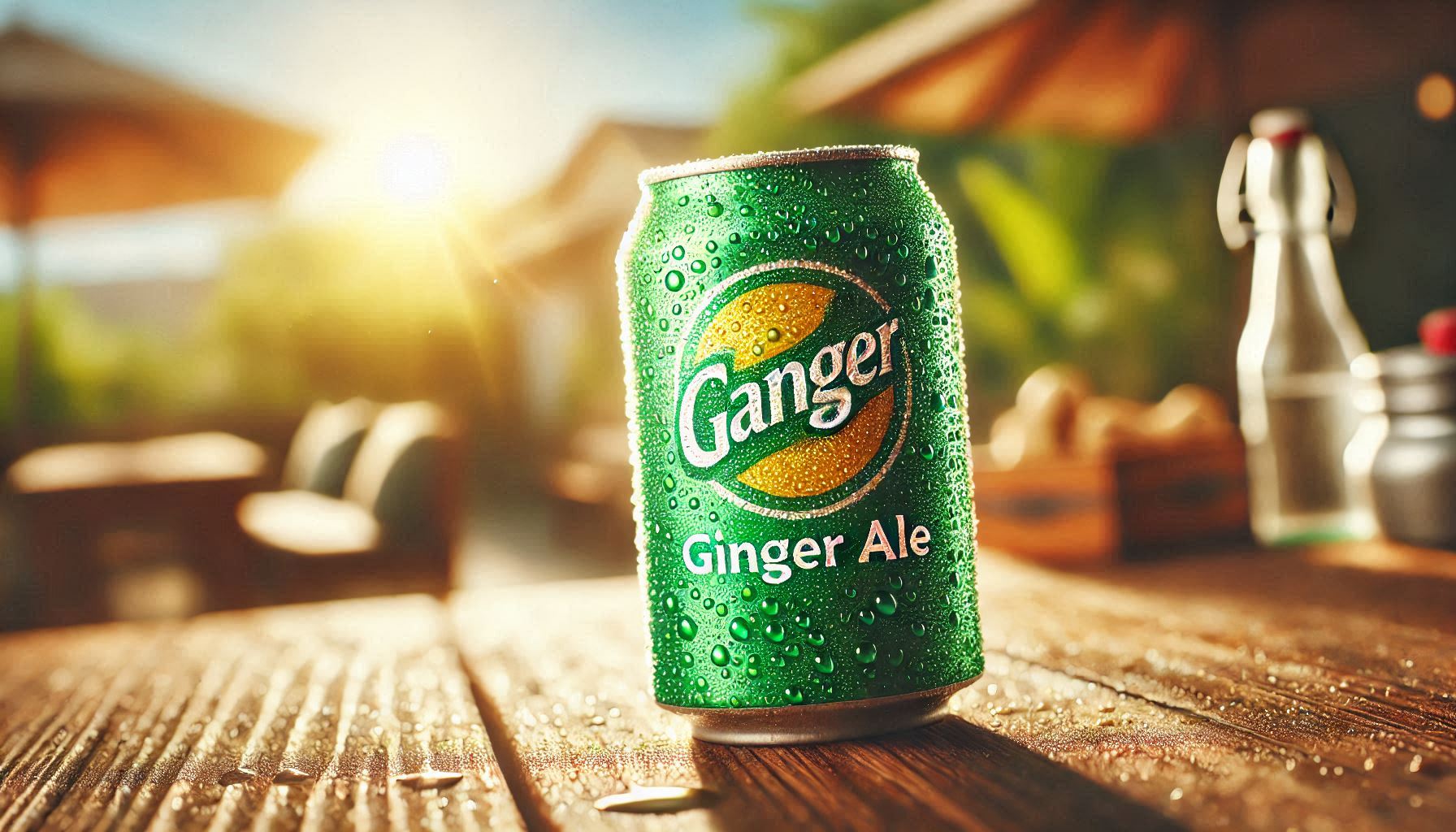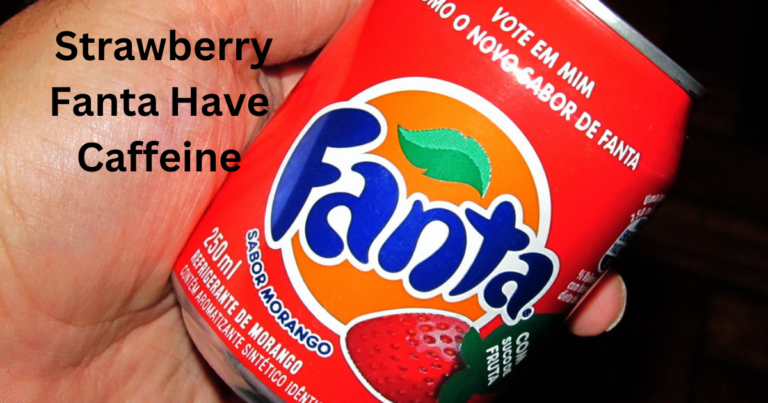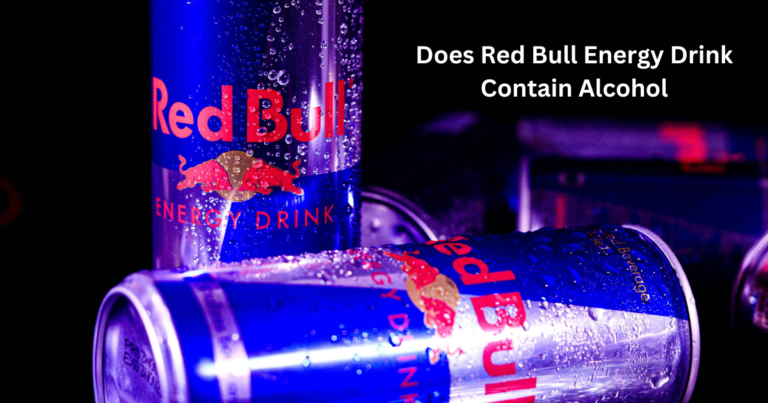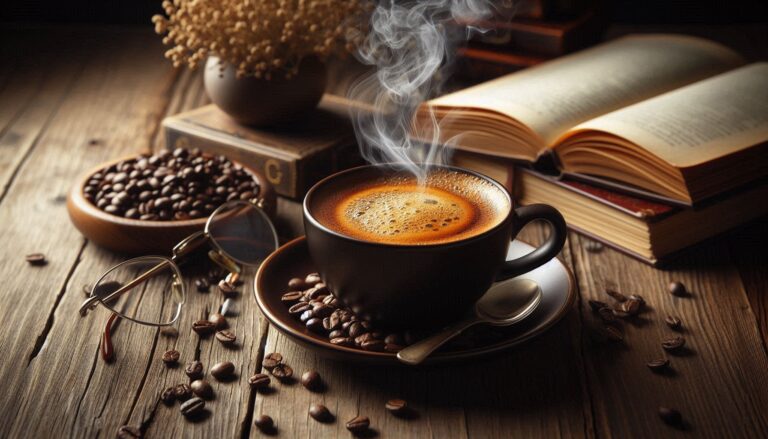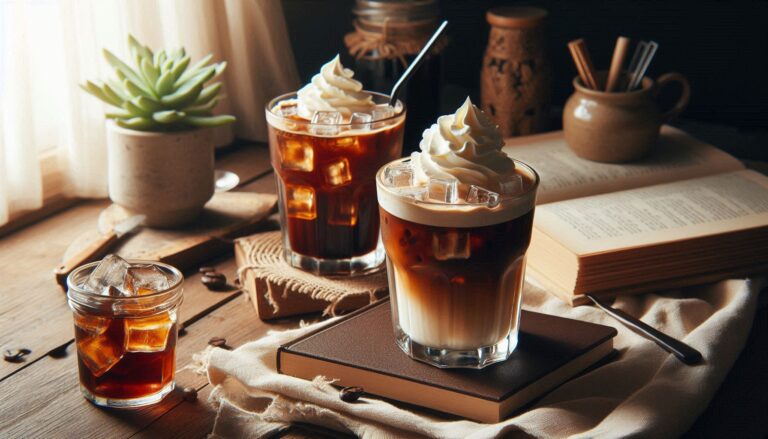Does Ginger Ale Have Caffeine The Truth
Ginger ale is a beloved beverage, particularly for those seeking a refreshing, caffeine-free option. Whether you’re unwinding after a long day, nursing an upset stomach, or simply craving something fizzy, ginger ale has become a go-to drink for many. But for those mindful of their caffeine intake, one question often arises: “Does ginger ale have caffeine?”
In this blog, we’ll dive into the caffeine content of ginger ale, exploring whether this bubbly drink contains any caffeine at all. You’ll also learn about the caffeine-free ginger ale options available, the caffeine content in beverages, and how ginger ale stacks up against other sodas. Beyond just the caffeine factor, we’ll discuss the health benefits of ginger ale, particularly for those looking for a natural way to ease nausea or an upset stomach. We’ll even take a look at popular brands like Canada Dry, Schweppes, and Seagram’s, examining their caffeine levels and what makes each one unique. If you’re wondering about alternatives or if ginger ale is truly healthy, this post will cover that too. Whether you’re a longtime fan or new to the drink, keep reading to find out everything you need to know!
What is Ginger Ale?
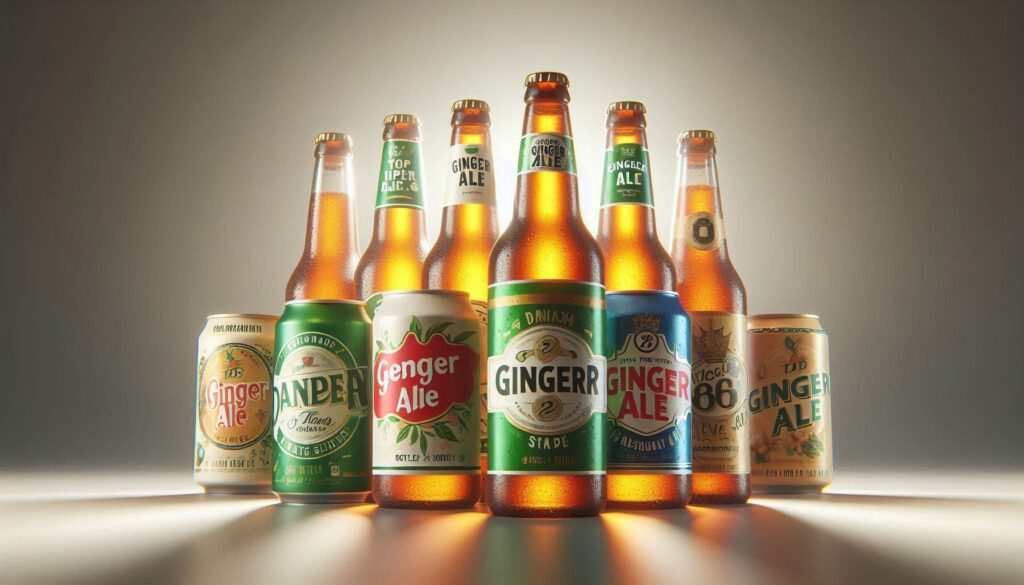
Ginger ale is a carbonated soft drink flavored with ginger and typically served chilled. It has been enjoyed for centuries and is widely popular for its refreshing, slightly spicy taste. There are two main types of ginger ale: dry ginger ale and golden ginger ale. Dry ginger ale is lighter and clearer in appearance, with a mild ginger flavor that makes it a popular mixer for cocktails. Golden ginger ale, on the other hand, has a darker color and a stronger, more robust ginger flavor, often favored for its deeper taste.
Historically, ginger ale originated in the 19th century, with the first commercial versions being produced in Ireland. Over time, it became a staple beverage in North America and beyond. Its popularity surged as people turned to ginger ale for medicinal purposes, especially for nausea and digestive issues, given ginger’s reputation as a natural remedy.
Today, ginger ale is a common drink enjoyed on its own or as part of mixed drinks, and it is especially popular during holidays or for those seeking caffeine-free alternatives to sodas.
As we explore ginger ale further, it’s important to examine the natural ginger ale ingredients and how they contribute to its flavor profile. But when it comes to its caffeine content, ginger ale is a go-to choice for those looking to avoid caffeine. Many brands produce caffeine-free ginger ale options, which has solidified its position as a widely available non-caffeinated drink. This makes it a great option for anyone looking for a refreshing beverage without the stimulating effects of caffeine.
Does Ginger Ale Have Caffeine?
If you’ve ever reached for a refreshing glass of ginger ale, you may have wondered: Does ginger ale contain caffeine? The good news is that, for the most part, ginger ale is caffeine-free. Most popular ginger ale brands are known for their lack of caffeine, making them an excellent choice for those who want to avoid stimulants.
When you look at the most popular ginger ale brands, such as Canada Dry, Schweppes, and Seagram’s, they are typically caffeine-free. In fact, Canada Dry ginger ale is widely recognized as a caffeine-free drink, making it a go-to option for those who want a soda without the buzz. Similarly, Seagram’s ginger ale has little to no caffeine content, further cementing its place as a caffeine-free soda alternative. These brands use a blend of natural ginger flavors and carbonated water, without adding any caffeine to their recipes.
However, while the majority of ginger ale is caffeine-free, it’s important to note that not all sodas are the same. There may be some ginger ale caffeine levels that are slightly different depending on regional variations or product lines. For instance, certain specialty or craft ginger ales may have unique formulations, but these are exceptions rather than the rule.
In comparison to other sodas like cola, which are known for their higher caffeine content, ginger ale stands out as a caffeine-free alternative. Most colas contain significant amounts of caffeine, making ginger ale a healthier and more calming choice, especially for people sensitive to caffeine or seeking a non-stimulating option.
So, to answer the question simply: No, ginger ale doesn’t typically contain caffeine—and popular brands like Seagram’s ginger ale and Canada Dry ginger ale are great options for those looking for a caffeine-free soda.
Caffeine Content in Beverages
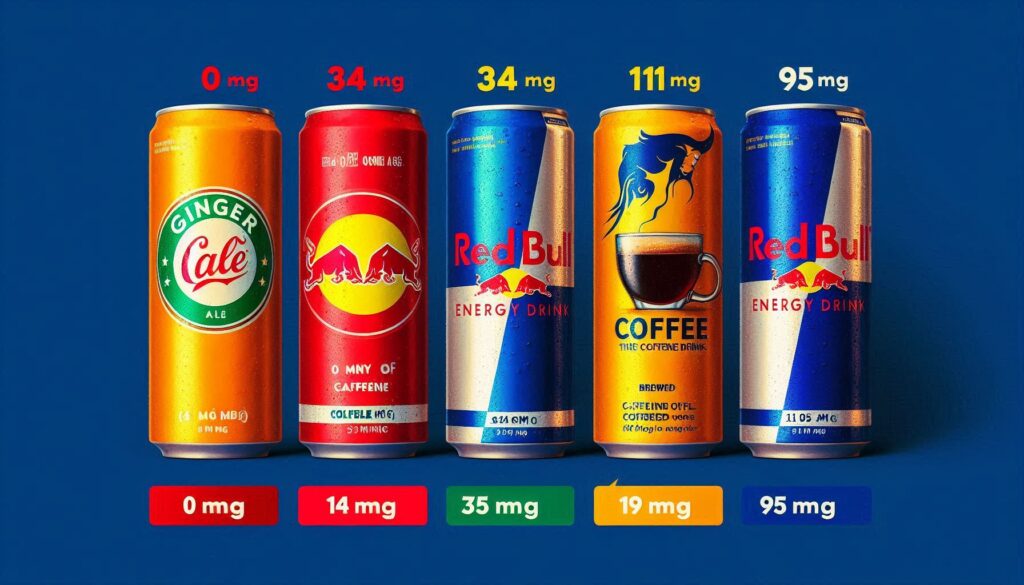
When it comes to selecting a beverage, the caffeine content can play a significant role in a person’s choice, especially for those sensitive to caffeine or looking to avoid it. Ginger ale is a popular choice among those avoiding caffeine, but how does it compare to other drinks like cola, energy drinks, and coffee? Let’s break it down.
Most ginger ale options, including brands like Canada Dry, Schweppes, and Seagram’s, are completely caffeine-free. This makes it a go-to drink for individuals who want to enjoy a fizzy, flavorful beverage without the side effects of caffeine. Ginger ale is naturally free from caffeine, unlike sodas like cola or more stimulating beverages like energy drinks or coffee.
Here’s a comparison of caffeine content in some popular beverages:
| Beverage | Caffeine Content (per 12 oz) |
|---|---|
| Ginger Ale | 0 mg |
| Cola (e.g., Coca-Cola) | 34 mg |
| Energy Drinks (e.g., Red Bull) | 111 mg |
| Coffee (Brewed) | 95 mg |
As you can see, cola contains around 34 mg of caffeine per 12 oz serving, and energy drinks can have much higher levels, such as 111 mg in a can of Red Bull. On the other hand, coffee contains 95 mg of caffeine per 12 oz, varying slightly depending on brewing methods. This makes ginger ale an excellent alternative for those looking to avoid these higher levels of caffeine.
For people who are caffeine-sensitive, such as pregnant women or individuals with heart conditions, ginger ale offers a safe, soothing option without the stimulating effects of caffeine. The absence of caffeine in ginger ale means it doesn’t lead to the jitteriness, anxiety, or sleep disturbances that can come with other caffeinated beverages.
Additionally, those looking for a caffeine-free alternative to cola or energy drinks often turn to ginger ale for its refreshing, flavorful taste without the buzz of caffeine. It’s an ideal choice for caffeine-free sodas, especially for those managing caffeine intake or trying to reduce consumption for health reasons.
In conclusion, ginger ale stands out as a caffeine-free option that caters to a wide range of people, especially those who prefer to avoid caffeine or are sensitive to its effects. Whether for health reasons or personal preference, it’s a great alternative to higher-caffeine beverages.
Best Caffeine-Free Ginger Ale Brands
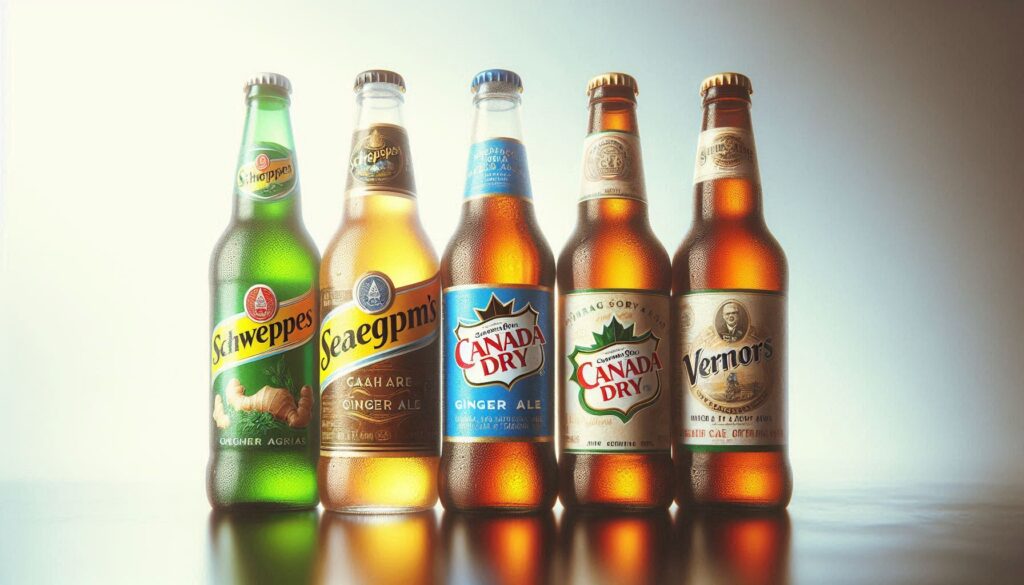
When it comes to best caffeine-free ginger ale brands, several options stand out for their quality, taste, and availability. Popular names like Schweppes, Seagram’s, Canada Dry, and Vernors have earned the trust of ginger ale drinkers across the globe, and each offers a slightly different experience.
- Schweppes Ginger Ale is one of the most well-known best ginger ale brands without caffeine. It has a crisp, refreshing taste with a perfect balance of sweetness and ginger flavor. Schweppes uses high-quality ingredients, making it a go-to choice for many who prefer a caffeine-free soda. It’s widely available, making it an easy pick for most consumers.
- Seagram’s Ginger Ale is another popular option in the world of caffeine-free ginger ales. Known for its smooth, mellow taste and less sharp ginger flavor compared to other brands, it offers a gentle and easy-drinking experience. Many consider Seagram’s ginger ale a reliable caffeine-free alternative to sodas with caffeine, offering a pleasant, soothing option for those avoiding stimulants.
- Canada Dry Ginger Ale is perhaps the most famous ginger ale brand, with its sweet and light flavor that’s perfect for mixing or enjoying on its own. This classic brand is also completely caffeine-free, making it a favorite for those seeking a non-caffeinated beverage. Canada Dry ginger ale is often used for its ability to ease an upset stomach, thanks to its smoothness and balance of ginger flavors.
- Vernors Ginger Ale, known for its distinctive, stronger ginger flavor, is a fan favorite among ginger ale enthusiasts. It’s caffeine-free, and its unique taste makes it stand out in a sea of milder ginger ales. The bold ginger kick combined with its syrupy sweetness offers a more intense ginger experience, perfect for those who enjoy a bolder flavor profile.
Other best caffeine-free sodas to consider are natural ginger beers and sparkling waters. These beverages provide a refreshing alternative without the caffeine hit, offering healthy options for those looking to stay hydrated while avoiding caffeine.
Ingredients in Ginger Ale
Ginger ale, a refreshing and soothing beverage, can be found in both natural and commercial versions. Understanding the ingredients in each can help you make informed decisions, especially if you’re concerned about health or dietary needs.
Natural Ginger Ale Ingredients
In its purest form, ginger ale is made from natural ingredients like real ginger root, carbonated water, and sweeteners such as cane sugar or honey. Ginger, known for its anti-inflammatory properties, is the star of the show, often providing digestive benefits and easing nausea. When made naturally, natural ginger ale ingredients are typically simple, with no added preservatives or artificial chemicals, offering a more wholesome choice for those looking to avoid additives.
Artificial Flavors in Ginger Ale
However, many commercial ginger ales contain artificial flavors in ginger ale to enhance the taste, especially if the product doesn’t use a significant amount of real ginger. These artificial flavors are often derived from chemicals designed to mimic the taste of ginger, citrus, or other spices. While these flavors make the drink more consistent in taste and less expensive to produce, they can be a concern for people sensitive to synthetic additives. Consumers seeking a more natural option should always check labels for any signs of artificial ingredients.
Low-Sugar Ginger Ale Options
Sugar content is another important factor to consider when choosing ginger ale. Traditional ginger ale often contains high amounts of sugar, which can contribute to weight gain and other health issues when consumed in excess. Thankfully, many brands now offer low-sugar ginger ale options, using sugar substitutes like stevia or monk fruit to lower the calorie count while still maintaining a sweet taste. If you’re watching your sugar intake, these options can be a great alternative without compromising on flavor.
Overall, the ingredients in ginger ale vary widely depending on the brand and the type. Whether you’re opting for a drink made with natural ginger ale ingredients, seeking out low-sugar ginger ale options, or trying to avoid artificial flavors in ginger ale, being mindful of what’s in your drink can help you make a healthier choice.
Health Benefits of Ginger Ale
Ginger ale is more than just a refreshing beverage—it offers several health benefits of ginger ale that make it a popular choice for those looking for natural relief from common ailments. One of its most recognized uses is for easing an upset stomach. The natural ginger root in many ginger ale brands can help soothe nausea and settle your digestive system, making it a go-to drink for people dealing with motion sickness, morning sickness, or stomach discomfort. Ginger ale for upset stomach is often recommended by those who prefer a gentle remedy over more medicinal options.
Additionally, ginger ale can provide hydration, although it’s not as hydrating as water or other electrolyte-rich drinks. While it may not be the first choice for hydration, it can still offer some relief for mild dehydration, especially when you need a bit of flavor to make drinking fluids more enjoyable. Is ginger ale good for hydration? The answer is yes, but with a caveat—it’s important to choose varieties with lower sugar content to ensure you’re not consuming excess calories.
For health-conscious individuals, many ginger ale brands now offer low-calorie and low-sugar ginger ale options that provide the same soothing benefits without the added sugar. These alternatives can be an excellent choice for those who want to enjoy a refreshing drink without derailing their healthy eating habits.
If you’re sensitive to caffeine, you’ll be happy to know that most ginger ales are caffeine-free. This makes it a great option for those looking to avoid caffeine while still enjoying a fizzy, flavorful drink. Whether you need something to settle your stomach or just want a caffeine-free option to enjoy throughout the day, ginger ale can offer both relief and refreshment.
Ginger Ale vs. Ginger Beer
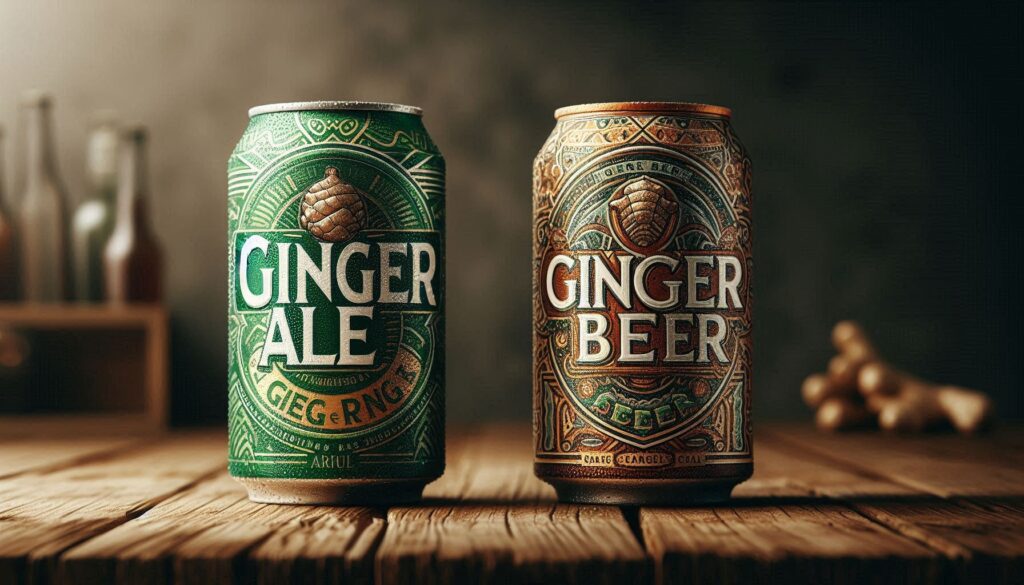
| Factor | Ginger Ale | Ginger Beer |
|---|---|---|
| Ingredients | Carbonated water, sweeteners, flavorings, ginger extract | Brewed ginger, sugar, water, yeast (fermented) |
| Caffeine Content | Usually caffeine-free | Can have trace amounts of caffeine depending on the brand |
| Taste Profile | Mild, sweet, and subtle ginger flavor | Strong, spicy, and more intense ginger taste |
| Alcohol Content | Non-alcoholic | Typically non-alcoholic but can have trace amounts due to fermentation |
| Health Benefits | Soothes an upset stomach, nausea, and aids hydration | Often used for its digestive benefits, but can be too spicy for some |
| Ideal for | People avoiding caffeine, those with a sensitive stomach | Those who enjoy stronger flavors and a more robust ginger taste |
| Best Use | A calming drink for nausea or mild digestive issues | A refreshing, flavorful drink for those looking for something more intense |
Alternatives to Ginger Ale
If you’re looking for alternatives to ginger ale, there are plenty of great options, especially if you’re avoiding caffeine or just want something different. One popular choice is sparkling water. Sparkling water vs ginger ale comes down to flavor and carbonation. While ginger ale offers a sweet, gingery flavor, sparkling water is more neutral, but you can easily add a splash of lemon or lime to enhance its taste. It’s a great caffeine-free drink that keeps you hydrated without any added sugars or artificial ingredients.
Another excellent alternative to ginger ale is herbal tea. Whether you go for a calming chamomile or a zesty peppermint, herbal teas are naturally caffeine-free and can be a soothing option. They can be enjoyed hot or iced, depending on your mood.
For those who love the taste of ginger but want something more natural, you can try making your own homemade ginger ale. The recipe is simple: mix fresh ginger juice, a bit of honey or your preferred sweetener, and some sparkling water. This way, you can enjoy a refreshing, homemade version without the added sugars or artificial flavors found in store-bought options.
With these alternatives, you have plenty of options to choose from when you’re looking for something caffeine-free but still flavorful and refreshing. Whether it’s sparkling water vs ginger ale or a homemade ginger ale recipe, you can easily find a drink that suits your needs.
Conclusion: Why Ginger Ale is a Great Caffeine-Free Choice
In summary, ginger ale is a popular caffeine-free beverage that provides a refreshing and soothing option for those looking to avoid caffeine. Whether you’re trying to reduce caffeine intake or seeking a gentler drink for an upset stomach, ginger ale for nausea or digestive discomfort can be a natural remedy. Unlike many sodas, ginger ale does not contain caffeine, making it an excellent choice for caffeine-sensitive people or those who prefer to steer clear of stimulants.
Opting for natural ginger ale ingredients ensures that you’re not consuming artificial additives or excess sugars. It’s also a great alternative to higher-calorie sodas and sugary energy drinks, which are often loaded with caffeine. For a more personalized touch, why not try a homemade ginger ale recipe? This way, you can control the ingredients and create a healthier, fresher version tailored to your taste. So next time you’re craving a bubbly, caffeine-free drink, remember that ginger ale—especially brands like Canada Dry ginger ale caffeine-free or Seagram’s ginger ale caffeine levels—is always a safe and enjoyable option for hydration.
